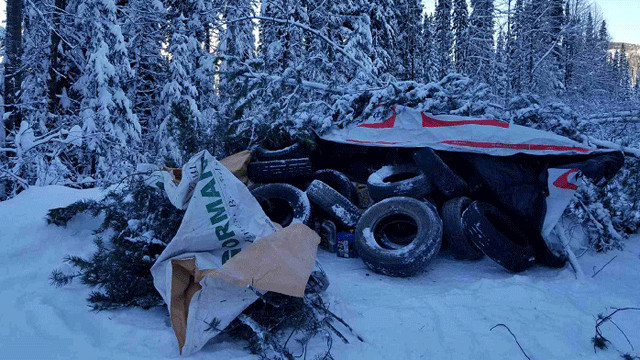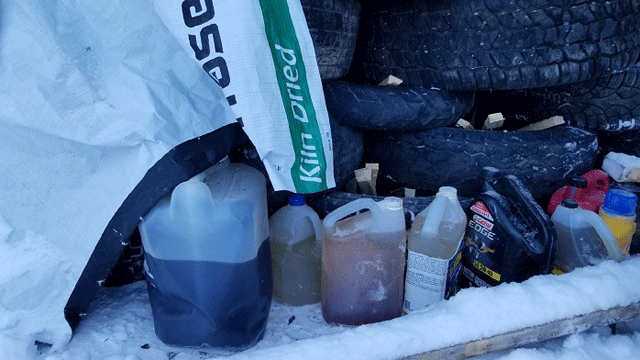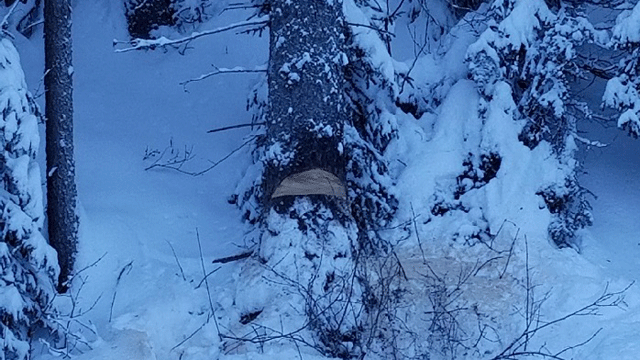
The RCMP in British Columbia has launched a criminal investigation into what it calls “a hazardous blockade” on the Morice West Forest Service Road (FSR) near Houston.
According to a release by Cpl. Madonna Saunderson, officers patrolling the area reported partially felled trees, along with the large ones already blocking the road and a stack of tires covered with tarps and smaller trees.
The Mounties also released pictures of jugs of gasoline and sticks of kindling at the base of the construction.
“This creates a hazard where these [half-cut] trees can fall unexpectedly due to wind. Three stacks of tires were also noticed, each covered by tarps and trees, and contained several jugs of accelerants – gasoline, diesel, oil, kindling and bags full of fuel soaked rags,” the release stated.
Hereditary Chief Na’moks (John Ridsdale) previously addressed the felled trees.
“Those trees put across the road were for our safety. We must look at the history of the RCMP one year ago and what they did to our people and the guests in our territory,” he said.
APTN News asked him about the tire barricade, including the accelerants, but did not hear back.

The Morice West FSR is a point of contention between five hereditary chiefs of the Wet’suwet’en Nation and the Coastal GasLink (CGL) pipeline company.
The company has agreements with 20 elected First Nations governments along the entire pipeline route, necessary permits and authorizations, and an interlocutory injunction from the B.C. Supreme Court that allow it to proceed with construction.
The Wet’suwet’en Nation consists of five federally recognized, elected First Nation governments – all of which have an agreement with CGL.
But hereditary chiefs of the five Wet’suwet’en clans oppose the 670-kilometre project, which would carry fracked natural gas across northern B.C. to a facility near Kitimat on the coast.
They assert Aboriginal title to unceded territories – Wet’suwet’en haven’t signed a treaty – and claim they’re asserting jurisdiction of Wet’suwet’en customary law.
The chiefs issued an “eviction notice” to the pipeline company, but CGL says it expects to resume construction this week.
B.C. Supreme Court ordered CGL to post the new injunction order to its website on Tuesday. The notice gave the pipeline company’s opponents 72-hours to clear the road of obstructions like the one above.
If they remain in place the RCMP can dismantle them and arrest anyone police believe is knowingly contravening the injunction order.
“These concerning items have been brought to the attention of the Wet’suwet’en Hereditary Chiefs. They have also been advised that the RCMP has entered into a criminal investigation under Section 247 of the Criminal Code for Traps Likely to Cause Bodily Harm,” the RCMP said about the new blockade.
The federal police force says it respects the right to protest within the parameters of the injunction but “will take steps to ensure that those who unlawfully interfere with or threaten the safety of any person or property may be held accountable in accordance with the laws of Canada.”
Today, CGL responded to the RCMP investigation by issuing a statement that supports the right to protest “peacefully and lawfully.”
“Our primary concern is the safety of all users of this public forestry road, including those who wish to protest our activities. Unlawful actions that put people at risk for serious harm are dangerous, reckless and unacceptable, and do not reflect peaceful protest,” President David Pfeiffer said.
He called on Na’moks to meet with the company to negotiate a peaceful outcome.

RCMP came under international scrutiny after The Guardian reported that officers were prepared to use lethal force against Wet’suwet’en and their supporters during the enforcement of an interim injunction a year ago.
During that raid, RCMP arrested 14 people that have since been released.
Though a repeat of last year’s conflict appears to be a possibility, the RCMP maintains it wants to avoid confrontation.
“We want to emphasize that we are impartial in this dispute and our priority is to facilitate a dialogue between the various stakeholders involved. We remain hopeful that these efforts will result in a resolution.”










“If the ‘Delgamuukw’ decision, that gave title to the Hereditary Chiefs stands tall like a tree,
then the Wet’suwet’sen Nation may consider the injunction Judgment to be
the chainsaw that made the first cuts that “partially felled ”that tree.”
Here is why:
• Did the Wet’suwet’en Nation feel especially provoked by the injunction? That is what I asked myself after reading the Judgment. I am not a lawyer. Surprisingly, commentary in the decision seemed to ignore the Supreme Court ‘Delgamuukw’ decision. I quickly re-scanned that old decision and I am convinced the injunction could have been ordered in a fashion that would have met the objectives of CGL, without having left the Hereditary Chiefs feeling quite so provoked – if indeed they are. I will give just one example from P[216] – [218] of the decision:
• “”The defendant submits that the issuance of an inerlocutory injunction.. ..will harm the Wet’suwet’sen legal order..” ..“The plaintiff (CGL) suggests the issue of public interest must be looked at more broadly..”
..“While the defendants suggest that there will be irreparable harm to the public interest to Dark House, it is NOT CLEAR (my caps) on the evidence before me that the same can be said for the Wet’suwet’sen nation as a whole..” “..many in the community who support the Pipeline Project (and ) are of the view that it will have substantial benefits to the Wet’suwet’sen nation as a whole.”
• The Judgment here seems to ignore, that ‘Delgamuukw’ ruled that it is the Hereditary Chiefs, who hold title and represent the “Wet’suwet’sen nation as a whole”. That is the state of the current law. They therefore have charge of safeguarding the legal order of the Nation. Never mind how many Indian Act Bands CGL cut a deal with. Here is how Bruce McIvor of First Peoples Law put it: https://www.firstpeopleslaw.com/index/articles/381.php
• “The Court held that the determination of who properly holds Aboriginal title is determined primarily from the view point of the Indigenous People making the claim.” / “The plaintiffs were the hereditary Chiefs of the Gitxsan and Wet’suwet’en Houses—not an Indian Act Chief & Council to be seen.” / “the organization of the Tsilhqot’in into bands as a result of the reserve allocation process and the Indian Act does not affect the identity of the Nation as the holder of rights.”
• And yet on the issue of who’s public interest is harmed, the injunction judgment implicitly comes down on the side of Indian Act Bands who did not seek title, and do not legally hold title – in a Judgment with commentary that I respectfully submit was not essential. And here we are.
• The five Hereditary Chiefs of the Big Frog, Small Frog, Wolf/Bear, Beaver and Fireweed national Clans, fought hard for the Delgamuukw decision that finally recognized title for the Clans and the Wet’suwet’en Nation as a whole. They continue to fight to halt fragmentation of the traditional territory in order to maintain that title for the whole Nation. From that perspective..
• ..if the ‘Delgamuukw’, decision that gave title to the Hereditary Chiefs stands tall like a tree, then the Wet’suwet’sen Nation may consider the injunction Judgment to be the chainsaw that made the first cuts that, “partially felled” that tree.
What? You don’t see that the elected ‘governments’ you speak of are Indian Act administrators with specific Indian Act duties restricted to “reserves”, which in the past functioned as concentration camps? Your report goes further that the colonial mass media in falsely opposing IA reserve councils against traditional hereditary governance over unceded territories. It is those traditionals who have confirmed their lawful jurisdiction by decades of litigation in the colonial courts. Or, do I misunderstand you?!